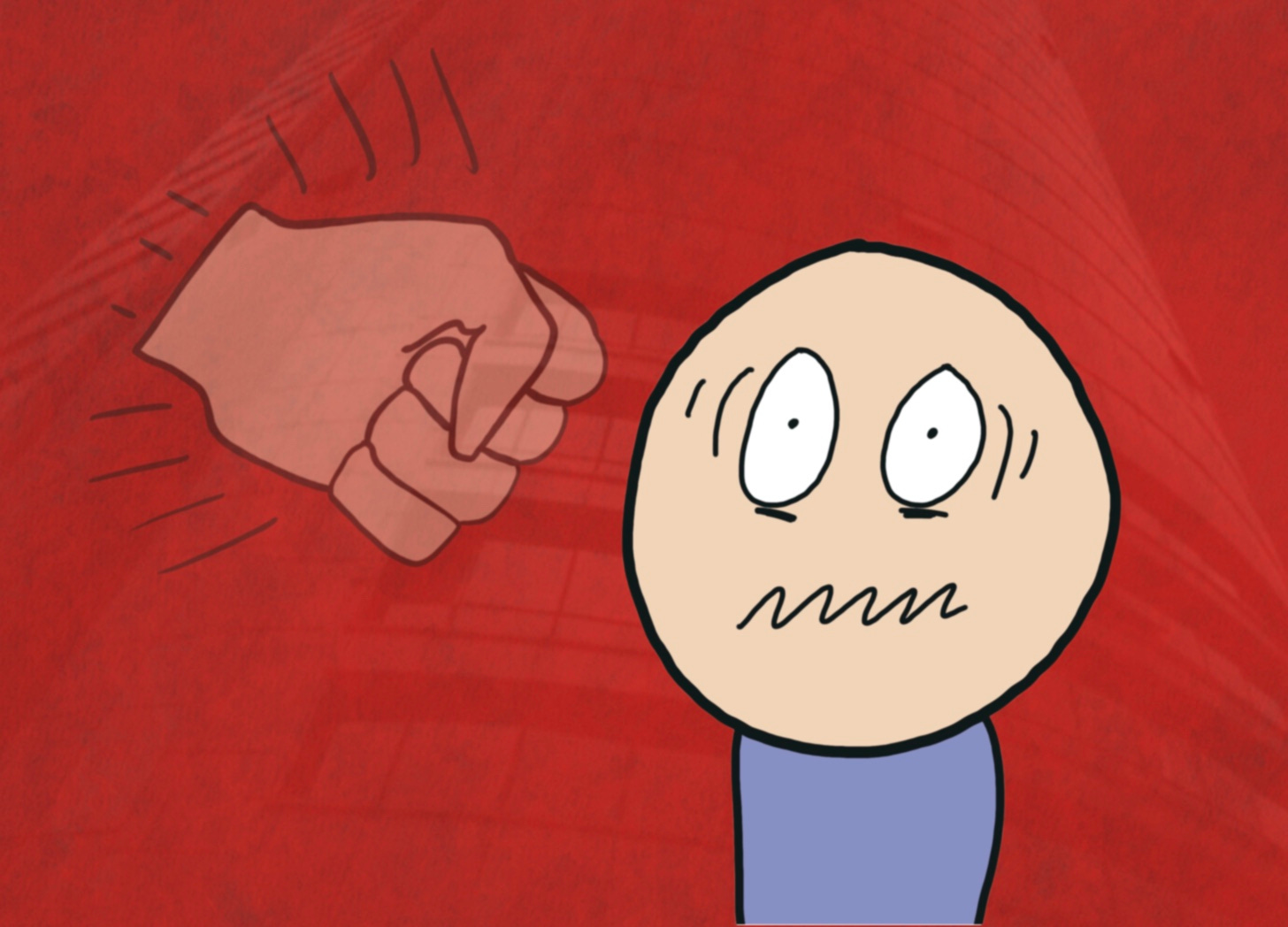The Invisible Fist of the Capitalism Punching You, Yes You, In the Face Forever
You Are Being Punched in the Face. It Will Not Stop.
Hi, I’m an existential imbecile named Max Murphy. Here on The Murphy Memos we explore the absurdity of existence with crappy cartoons.
Consider subscribing if you’re into that kinda thing.. or don’t!
Adam Smith believed in magic.
Not the wand-waving kind but something close. He believed that if everyone pursued their own self-interest, an “invisible hand” would guide the market toward prosperity. Everyone gets what they need. Everyone wins. A rising tide lifts all boats. Cue the string section.
But somewhere between the 18th century and the Silicon Valley IPO, something went horribly wrong.
The invisible hand got greedy—clenched itself into a fist.
And now it’s punching you in the face. It isn’t going to stop either.
Not when it takes all your money.
Not when it obliterates your dreams into smithereens.
Not even when it crushes the last droplets of hope left in your withering heart.
The invisible fist of the free market wants more.
How much more?
Just more.
Forever.
What Adam Smith Got Right
Smith wasn’t naive. He didn’t trust corporations—because they didn’t exist yet. His enemies were landlords and monarchs, the old feudal powers who extracted wealth without producing anything. In The Wealth of Nations, he roasted landlords as those who “love to reap where they never sowed.”
He saw early capitalism as a liberating force. Markets, he believed, could free us from the parasitic grip of the aristocracy. No more divine right of kings. No more lords owning the land and the people on it. Instead, voluntary exchange! Individual liberty! Prices as signals (not shackles).
It was a beautiful idea.
But it stayed an idea.
The Game Where Everyone Loses
Markets are games—systems of rules, incentives, and outcomes. But unlike poker or Monopoly, this has no official endpoint. No reset. No "you’ve won, please stop now."
That’s the problem.
Because if there’s a game, someone’s going to figure out how to win it.
And when they do, they don’t stop playing. They buy the rulebook. Then they buy the referees. Then they install an Orwellian surveillance system that watches every move you make.
We’ve been told the market rewards competition.
But is that what happens in practice?
When corporations get big enough, they don’t innovate—they consolidate. They crush small businesses, hoard resources, and manipulate policy to ensure no one else can climb the ladder behind them. Amazon didn’t outcompete your local bookstore—they steamrolled it. Uber didn’t beat the taxi industry—they torched it and salted the earth. And still, it isn’t enough. Never will be.
So long as there is something more to take from you, the invisible fist keeps punching.
The New Gilded Age
For a brief window in the 20th century, the invisible fist relaxed its grip.
After the Great Depression—and the widespread fear that the American working class might go full Bolshevik—the ruling class made a deal.
That deal was called the New Deal.
It was a compromise: the capitalists agreed to take their boot off the workers’ necks (a little), and in return, the workers agreed not to violently overthrow them. Social Security, labor protections, public works projects, and progressive taxation kept the peace.
What resulted?
An unprecedented age of prosperity, development, and innovation.
That’s what the boomers got.
Must’ve been nice.
But when the fear of revolution faded—when the labor movement was weakened, when the Soviet Union collapsed, when corporate lobbying fully captured Washington—the deal was off.
Enter: neoliberalism.
In the 1980s, Ronald Reagan looked at that post-war compromise and saw weakness. His message was simple: Make America Great Again—which really meant Bring Back the Face Punching.
Deregulate the banks. Crush the unions. Privatize everything. Slash the safety nets. Let the market roam “free”—free, that is, to concentrate gargantuan wealth, demolish the middle class, and convert every shared space into a profit center.
Neoliberalism wasn’t just a policy—it was a philosophy. It taught us that society doesn’t exist, only individuals. That freedom means shopping. That poverty is a moral failure. That the rich are “job creators” and we are all temporarily embarrassed millionaires.
The end result?
The dictatorship of the invisible fist.
The Fist is Everywhere
Today, the invisible fist permeates the atmosphere—forever clenched—just waiting until it can punch you yet again.
You don’t resist it—resistance is futile after all.
You budget for it.
You meme about it.
You read essays complaining about it on the internet.
This is what Mark Fisher called Capitalist Realism: the widespread belief that this is not just the only viable system—it’s the only imaginable one. That no matter how brutal, inefficient, or soul-crushing it becomes, it’s still better than… what? Starvation? Communism? Uncertainty?
Our dreams no longer include utopian visions of the future, only surviving the dystopia that constitutes every second of our waking lives.




I can't recommend this post enough. Now I have to go get groceries and another punch in the face.
The invisible fist is in in our collective (eek!) face for those with eyes to see!
There’s nothing like inverted socialism for those who own everything. That they strive for even more provides a clue to how depraved they are. Norm MacDonald circa 1995: “in 1995 Bill Gates is once again the richest man in the country. But it still makes him sad to see other people with anything whatsoever “